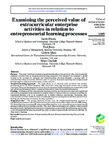Examining the perceived value of extracurricular enterprise activities in relation to entrepreneurial learning processes
| dc.contributor.author | Preedy, Sarah | |
| dc.contributor.author | Jones, Paul | |
| dc.contributor.author | Maas, Gideon | |
| dc.contributor.author | Duckett, H | |
| dc.date.accessioned | 2023-01-05T15:19:55Z | |
| dc.date.available | 2023-01-05T15:19:55Z | |
| dc.date.issued | 2020-10-29 | |
| dc.identifier.issn | 1462-6004 | |
| dc.identifier.uri | http://hdl.handle.net/10026.1/20145 | |
| dc.description.abstract |
<jats:sec><jats:title content-type="abstract-subheading">Purpose</jats:title><jats:p>This study contributes towards increased understanding of the perceived value of extracurricular enterprise activities from an entrepreneurial learning perspective. Past decades have witnessed a global increase in the provision of enterprise and entrepreneurship education alongside a growing suite of extracurricular enterprise activities. However, there is a paucity of research examining how entrepreneurial learning might be understood in the context of these activities.</jats:p></jats:sec><jats:sec><jats:title content-type="abstract-subheading">Design/methodology/approach</jats:title><jats:p>The study draws on an empirical study of student and educator participants across 24 United Kingdom (UK) universities using semi-structured surveys and in-depth interviews. Three main learning theories drawn from the entrepreneurial learning literature: experiential, social and self-directed learning provided a conceptual framework to frame the research phenomenon.</jats:p></jats:sec><jats:sec><jats:title content-type="abstract-subheading">Findings</jats:title><jats:p>Findings posit that extracurricular enterprise activities provide perceived value in the experiential and social learning opportunities afforded for students. However, these activities are restricted in enabling the experiential learning cycle to be completed due to limited reflection opportunities. Positioning these extracurricular activities outside the main curriculum also empowers participants to self-direct aspects of their learning and develop their autonomous learning capabilities.</jats:p></jats:sec><jats:sec><jats:title content-type="abstract-subheading">Originality/value</jats:title><jats:p>The existing literature focusses upon the entrepreneurial learning processes of established entrepreneurs rather than latent and nascent entrepreneurs within a higher education (HE) setting. The limited literature examining HE entrepreneurial learning does so by concentrating upon entrepreneurial learning resulting from in-curricular activities. This study offers novel insights into students’ entrepreneurial learning processes, highlighting the importance of experiential, social and self-directed learning opportunities to the entrepreneurial learning process and the perceived value of extracurricular activities as a platform for these types of learning.</jats:p></jats:sec> | |
| dc.format.extent | 1085-1105 | |
| dc.language | en | |
| dc.language.iso | en | |
| dc.publisher | Emerald | |
| dc.title | Examining the perceived value of extracurricular enterprise activities in relation to entrepreneurial learning processes | |
| dc.type | journal-article | |
| dc.type | Journal Article | |
| plymouth.issue | 7 | |
| plymouth.volume | 27 | |
| plymouth.publication-status | Published | |
| plymouth.journal | Journal of Small Business and Enterprise Development | |
| dc.identifier.doi | 10.1108/jsbed-12-2019-0408 | |
| plymouth.organisational-group | /Plymouth | |
| plymouth.organisational-group | /Plymouth/Faculty of Arts, Humanities and Business | |
| plymouth.organisational-group | /Plymouth/Faculty of Arts, Humanities and Business/Plymouth Business School | |
| plymouth.organisational-group | /Plymouth/Users by role | |
| plymouth.organisational-group | /Plymouth/Users by role/Academics | |
| dc.rights.embargoperiod | Not known | |
| rioxxterms.versionofrecord | 10.1108/jsbed-12-2019-0408 | |
| rioxxterms.licenseref.uri | http://www.rioxx.net/licenses/all-rights-reserved | |
| rioxxterms.type | Journal Article/Review |


